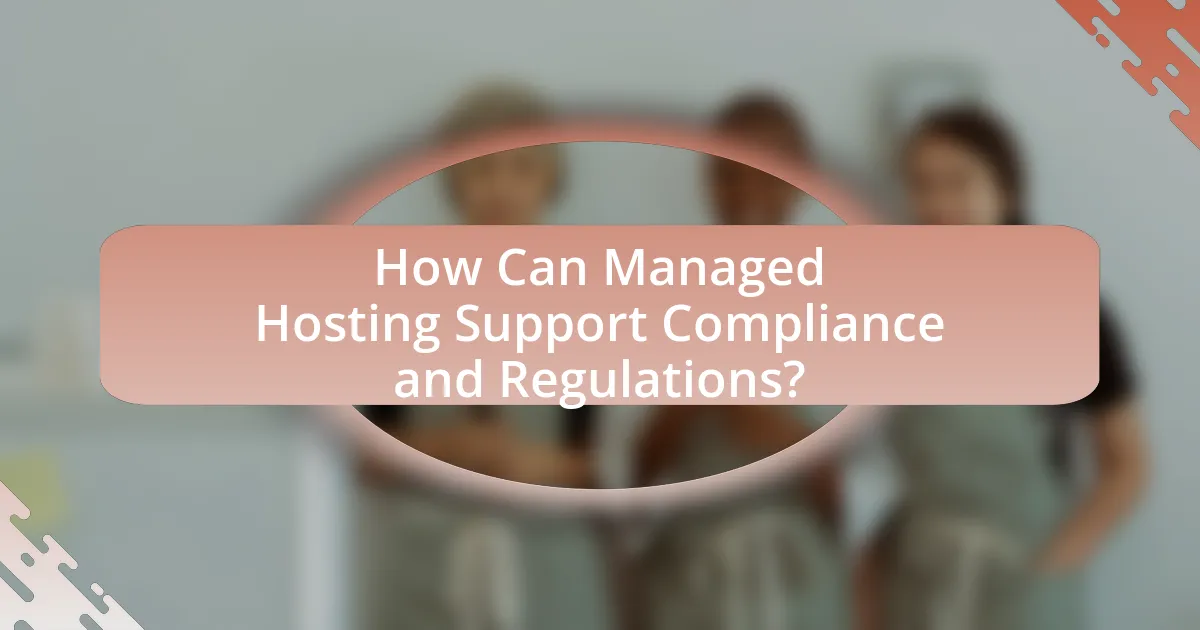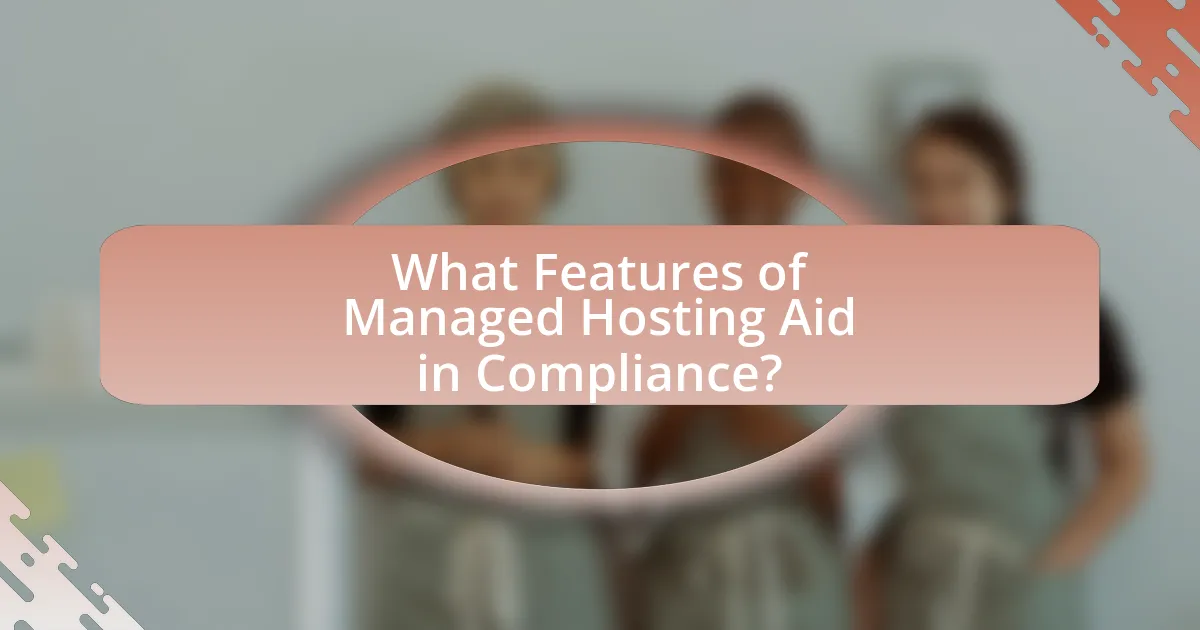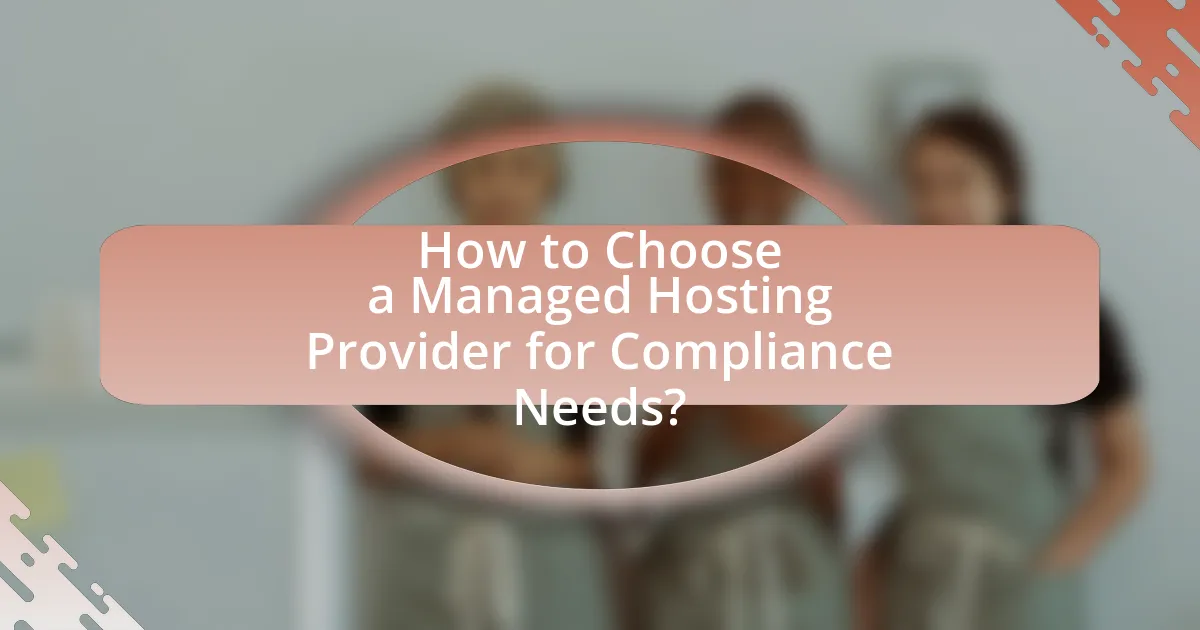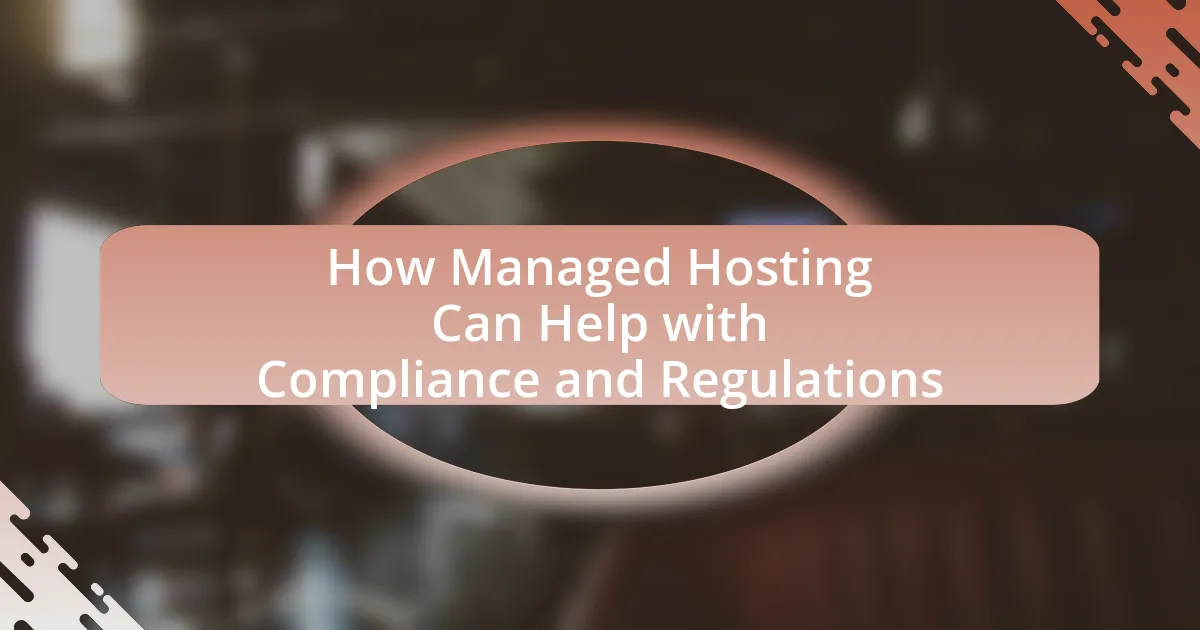Managed hosting is a service that provides dedicated resources and expertise to help organizations comply with various industry regulations, such as GDPR, HIPAA, PCI DSS, and ISO 27001. This article outlines how managed hosting supports compliance through robust security measures, regular audits, and monitoring services, which are essential for protecting sensitive data. Key features such as data encryption, access controls, and compliance reporting tools are discussed, highlighting their role in maintaining adherence to regulatory standards. Additionally, the article emphasizes the importance of selecting a compliant managed hosting provider and implementing best practices for ongoing compliance management.

How Can Managed Hosting Support Compliance and Regulations?
Managed hosting can support compliance and regulations by providing dedicated resources and expertise tailored to meet specific industry standards. Managed hosting providers often implement robust security measures, such as encryption and firewalls, which are essential for compliance with regulations like GDPR and HIPAA. Additionally, these providers typically offer regular audits and monitoring services that ensure ongoing adherence to compliance requirements. For example, according to a report by the International Association of Privacy Professionals, organizations that utilize managed hosting services are 30% more likely to maintain compliance with data protection regulations due to the specialized support and infrastructure provided.
What are the key compliance standards that managed hosting can help meet?
Managed hosting can help meet key compliance standards such as GDPR, HIPAA, PCI DSS, and ISO 27001. These standards require specific data protection measures, and managed hosting providers typically implement robust security protocols, regular audits, and data management practices to ensure compliance. For instance, GDPR mandates strict data privacy regulations for organizations handling EU citizens’ data, while HIPAA sets standards for protecting sensitive health information in the U.S. PCI DSS outlines security measures for organizations that handle credit card transactions, and ISO 27001 provides a framework for establishing, implementing, and maintaining an information security management system. Managed hosting services often include features like encryption, access controls, and compliance reporting, which facilitate adherence to these standards.
How does managed hosting align with GDPR requirements?
Managed hosting aligns with GDPR requirements by ensuring that data is stored and processed in compliance with privacy regulations. Managed hosting providers typically implement robust security measures, such as encryption and access controls, to protect personal data, which is a key requirement of GDPR. Additionally, these providers often offer data residency options, allowing businesses to store data within the EU, thus adhering to GDPR’s stipulations regarding data transfer outside the EU. Furthermore, managed hosting services usually include features like regular security audits and compliance certifications, which help organizations demonstrate their commitment to GDPR compliance.
What role does managed hosting play in HIPAA compliance?
Managed hosting plays a critical role in HIPAA compliance by providing a secure environment for storing and processing protected health information (PHI). Managed hosting services typically include features such as data encryption, regular security audits, and compliance certifications, which are essential for meeting HIPAA’s stringent requirements. For instance, managed hosting providers often implement access controls and monitoring systems to safeguard PHI, ensuring that only authorized personnel can access sensitive data. Additionally, many managed hosting solutions offer Business Associate Agreements (BAAs), which are necessary for HIPAA compliance, as they outline the responsibilities of the hosting provider in protecting PHI.
Why is compliance important for businesses using managed hosting?
Compliance is crucial for businesses using managed hosting because it ensures adherence to legal, regulatory, and industry standards, thereby mitigating risks associated with data breaches and legal penalties. Managed hosting providers often implement robust security measures and protocols that align with compliance requirements, such as GDPR or HIPAA, which helps businesses protect sensitive information. For instance, a study by the Ponemon Institute found that companies with strong compliance programs can reduce the cost of data breaches by an average of 30%. This demonstrates that compliance not only safeguards data but also enhances a business’s reputation and trustworthiness in the market.
What risks do businesses face without compliance?
Businesses face significant risks without compliance, including legal penalties, financial losses, and reputational damage. Non-compliance can lead to fines that may reach millions of dollars, as seen in cases like the GDPR violations where companies faced penalties up to 4% of their annual global turnover. Additionally, businesses may experience operational disruptions due to legal actions or regulatory investigations, which can hinder productivity and lead to further financial strain. Reputational damage can result in loss of customer trust and market share, as consumers increasingly prefer to engage with compliant organizations. Therefore, the absence of compliance not only exposes businesses to immediate legal and financial repercussions but also jeopardizes their long-term viability and success.
How can compliance enhance customer trust and brand reputation?
Compliance enhances customer trust and brand reputation by demonstrating a commitment to ethical practices and regulatory standards. When organizations adhere to compliance requirements, they signal to customers that they prioritize data protection, privacy, and security. This is particularly important in industries such as finance and healthcare, where regulations like GDPR and HIPAA mandate strict data handling protocols. Research indicates that 75% of consumers are more likely to trust brands that comply with regulations, as compliance fosters transparency and accountability. Consequently, businesses that maintain compliance not only mitigate risks but also build stronger relationships with customers, leading to increased loyalty and positive brand perception.

What Features of Managed Hosting Aid in Compliance?
Managed hosting aids in compliance through features such as data encryption, regular security audits, and adherence to industry standards. Data encryption protects sensitive information during transmission and storage, ensuring that unauthorized access is prevented. Regular security audits help identify vulnerabilities and ensure that the hosting environment meets compliance requirements, such as those outlined by GDPR or HIPAA. Additionally, managed hosting providers often implement strict access controls and monitoring systems, which further enhance compliance by tracking user activity and ensuring that only authorized personnel have access to sensitive data. These features collectively support organizations in maintaining regulatory compliance and safeguarding their data.
How does data security in managed hosting contribute to compliance?
Data security in managed hosting significantly contributes to compliance by ensuring that sensitive information is protected according to regulatory standards. Managed hosting providers implement robust security measures, such as encryption, firewalls, and regular security audits, which align with compliance requirements like GDPR, HIPAA, and PCI DSS. For instance, GDPR mandates strict data protection protocols, and managed hosting services that utilize advanced security technologies help organizations meet these legal obligations by safeguarding personal data against breaches. This alignment not only mitigates the risk of non-compliance penalties but also enhances the overall trustworthiness of the organization in handling sensitive information.
What encryption methods are commonly used in managed hosting?
Common encryption methods used in managed hosting include SSL/TLS, AES, and RSA. SSL/TLS is widely implemented to secure data in transit between clients and servers, ensuring confidentiality and integrity. AES (Advanced Encryption Standard) is frequently utilized for encrypting data at rest, providing robust security for stored information. RSA (Rivest-Shamir-Adleman) is often employed for secure key exchange and digital signatures, enhancing authentication processes. These methods are essential for compliance with regulations such as GDPR and HIPAA, which mandate the protection of sensitive data.
How do access controls in managed hosting environments support compliance?
Access controls in managed hosting environments support compliance by ensuring that only authorized personnel can access sensitive data and systems. These controls are critical for adhering to regulations such as GDPR, HIPAA, and PCI-DSS, which mandate strict access management to protect personal and financial information. For instance, managed hosting providers often implement role-based access controls (RBAC) that limit user permissions based on their job functions, thereby minimizing the risk of unauthorized access. Additionally, audit trails and logging mechanisms are typically employed to track access and modifications, providing necessary documentation for compliance audits. This structured approach to access management not only safeguards data but also demonstrates a commitment to regulatory standards, thereby enhancing overall compliance posture.
What monitoring and reporting tools are available in managed hosting?
Managed hosting offers various monitoring and reporting tools, including performance monitoring, security monitoring, and compliance reporting tools. Performance monitoring tools track server uptime, response times, and resource usage, ensuring optimal performance. Security monitoring tools detect vulnerabilities, unauthorized access, and malware, helping to maintain a secure environment. Compliance reporting tools generate reports that align with regulatory standards, such as GDPR or HIPAA, ensuring that managed hosting services meet necessary compliance requirements. These tools collectively enhance visibility and control over the hosting environment, facilitating adherence to compliance and regulatory standards.
How can automated compliance reporting simplify audits?
Automated compliance reporting simplifies audits by streamlining data collection and analysis, reducing the time and effort required for compliance verification. This technology enables organizations to automatically gather relevant data from various sources, ensuring accuracy and consistency in reporting. For instance, a study by Deloitte found that organizations using automated reporting tools reduced audit preparation time by up to 50%. By minimizing manual processes, automated compliance reporting not only enhances efficiency but also decreases the likelihood of human error, leading to more reliable audit outcomes.
What role does real-time monitoring play in maintaining compliance?
Real-time monitoring plays a crucial role in maintaining compliance by providing continuous oversight of systems and processes to ensure adherence to regulatory standards. This proactive approach allows organizations to detect and address compliance issues as they arise, minimizing the risk of violations. For instance, real-time monitoring can track user activities, system configurations, and data access, enabling immediate alerts for any anomalies that may indicate non-compliance. According to a report by the Ponemon Institute, organizations that implement real-time monitoring can reduce the average cost of compliance violations by up to 30%, demonstrating its effectiveness in safeguarding compliance.

How to Choose a Managed Hosting Provider for Compliance Needs?
To choose a managed hosting provider for compliance needs, prioritize providers that demonstrate expertise in relevant regulations such as GDPR, HIPAA, or PCI-DSS. These providers should offer compliance certifications and have a proven track record of maintaining security and data integrity. For instance, a provider with ISO 27001 certification indicates adherence to international information security standards, which is crucial for compliance. Additionally, assess their data protection measures, including encryption, access controls, and regular audits, to ensure they align with your compliance requirements.
What criteria should businesses consider when selecting a managed hosting provider?
Businesses should consider the provider’s compliance certifications, security measures, support services, scalability options, and performance guarantees when selecting a managed hosting provider. Compliance certifications, such as ISO 27001 or GDPR adherence, ensure that the provider meets industry standards for data protection and privacy. Robust security measures, including firewalls, DDoS protection, and regular security audits, are essential to safeguard sensitive information. Reliable support services, available 24/7, are crucial for addressing technical issues promptly. Scalability options allow businesses to adjust resources based on demand, ensuring optimal performance. Performance guarantees, such as uptime commitments, provide assurance of service reliability. These criteria collectively help businesses ensure that their managed hosting provider can effectively support compliance and regulatory requirements.
How important is the provider’s experience with compliance regulations?
The provider’s experience with compliance regulations is critically important. A provider with extensive experience ensures adherence to legal and industry standards, minimizing the risk of non-compliance penalties. For instance, according to a study by the Ponemon Institute, organizations that fail to comply with regulations can face fines averaging $14.82 million, highlighting the financial implications of inadequate compliance management. Furthermore, experienced providers are more likely to implement effective compliance strategies, which can enhance operational efficiency and build trust with clients.
What certifications should a compliant managed hosting provider have?
A compliant managed hosting provider should have certifications such as ISO 27001, SOC 2 Type II, and PCI DSS. ISO 27001 demonstrates a commitment to information security management, ensuring that the provider has established a systematic approach to managing sensitive company information. SOC 2 Type II certification verifies that the provider adheres to strict security, availability, processing integrity, confidentiality, and privacy standards over a specified period. PCI DSS certification is essential for providers handling credit card transactions, ensuring they meet security standards to protect cardholder data. These certifications collectively indicate that the managed hosting provider is equipped to handle compliance and regulatory requirements effectively.
What are the best practices for ensuring ongoing compliance with managed hosting?
The best practices for ensuring ongoing compliance with managed hosting include regular audits, maintaining up-to-date documentation, implementing security controls, and continuous monitoring of systems. Regular audits help identify compliance gaps and ensure adherence to regulations such as GDPR or HIPAA. Up-to-date documentation provides a clear record of compliance efforts and policies, which is essential for regulatory reviews. Implementing security controls, such as firewalls and encryption, protects sensitive data and meets compliance requirements. Continuous monitoring of systems allows for real-time detection of compliance issues, enabling prompt remediation. These practices collectively ensure that managed hosting environments remain compliant with applicable regulations.
How can regular audits and assessments be integrated into managed hosting strategies?
Regular audits and assessments can be integrated into managed hosting strategies by establishing a systematic schedule for evaluations that align with compliance requirements. Managed hosting providers can implement continuous monitoring tools to assess security, performance, and compliance metrics in real-time, ensuring that any deviations from standards are promptly addressed. For instance, organizations can utilize frameworks such as ISO 27001 or SOC 2, which provide guidelines for regular audits, thereby reinforcing adherence to regulatory requirements. This integration not only enhances security posture but also builds trust with clients by demonstrating a commitment to compliance and risk management.
What steps can businesses take to stay updated on compliance changes?
Businesses can stay updated on compliance changes by implementing a systematic approach that includes subscribing to regulatory updates, engaging with industry associations, and utilizing compliance management software. Subscribing to newsletters from regulatory bodies ensures that businesses receive timely information on changes. Engaging with industry associations provides networking opportunities and insights from peers about compliance trends. Utilizing compliance management software helps automate tracking and reporting, ensuring that businesses remain compliant with the latest regulations. These steps are essential for maintaining adherence to evolving compliance requirements in a dynamic regulatory landscape.


